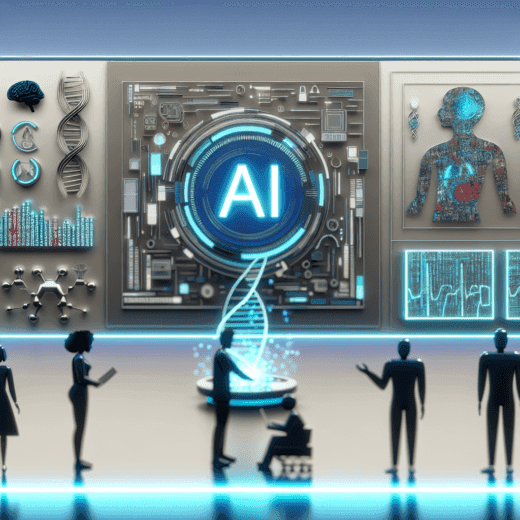Introduction to AI-Powered Symptom Checkers
The advent of artificial intelligence (AI) in healthcare marks a transformative era in diagnostics and patient care. Among the many innovations, AI-powered symptom checkers have emerged as promising tools that leverage technology to empower individuals in managing their health. These applications analyze data inputs to provide insights into potential health issues based on user-reported symptoms. By facilitating early diagnosis and encouraging proactive health management, AI symptom checkers have the potential to significantly enhance healthcare accessibility and efficiency.
The Innovation Potential of AI-Powered Symptom Checkers
As technology advances, AI-powered symptom checkers are reshaping traditional health diagnostics by offering an interactive platform that translates symptoms into actionable health advice. By combining machine learning algorithms with vast databases of medical knowledge, these tools can deliver preliminary health assessments. As a result, they serve as an initial step for patients before seeking professional medical advice, ultimately reducing the burden on healthcare systems. Moreover, AI symptom checkers can enhance patient engagement by offering personalized insights, thereby encouraging self-monitoring and health literacy.
Market Disruption: Redefining Traditional Healthcare Models
The rise of AI-powered symptom checkers signifies a shift towards digital health and telemedicine, challenging the conventional methods of patient care. These platforms disrupt existing healthcare systems by decentralizing the initial diagnosis process, offering a cost-effective solution to millions who lack immediate access to medical professionals. With smartphone penetration on the rise and an increasing number of users turning to digital solutions for health management, the market for AI symptom checkers is set to grow exponentially. This evolution not only fosters competition among healthcare providers but also opens doors for innovative startups to introduce cutting-edge solutions.
Key Challenges in Implementing AI Symptom Checkers
Despite their promising potential, AI-powered symptom checkers face several challenges that must be addressed to ensure widespread adoption. One critical issue is ensuring the accuracy and reliability of diagnoses. The healthcare environment is complex, and symptom interpretation can be subjective, raising concerns about the precision of AI assessments. Additionally, data privacy and security remain top concerns, particularly when sensitive health information is involved. Ensuring compliance with regulations such as HIPAA and GDPR is essential for building trust and safeguarding user data.
Unique Opportunities in the Startup Space
AI-powered symptom checkers present a unique opportunity for startups to carve out a niche within the booming health tech industry. Startups can innovate by developing user-friendly interfaces, integrating with existing healthcare systems, and offering multilingual support to reach a global audience. By forming strategic partnerships with healthcare providers, insurance companies, and technology firms, startups can expand their reach and scale their operations efficiently. The potential for data-driven insights also opens opportunities for startups to offer tailored solutions and personalized health recommendations.
Fundraising Strategies for AI Symptom Checker Startups
Securing funding is a critical step for any startup aiming to disrupt the healthcare market with AI technology. Entrepreneurs should develop a compelling pitch that highlights the innovative aspects of their solution, market potential, and social impact. Demonstrating a reduced strain on healthcare systems and improved patient outcomes can attract investment from venture capitalists, angel investors, and healthcare-focused funds. Participating in startup accelerators and incubator programs can also provide networking opportunities, mentorship, and essential resources for growth.
Scaling and Achieving Product-Market Fit
Successfully scaling an AI-powered symptom checker requires careful market analysis, product tweaks, and user feedback to achieve product-market fit. Startups should focus on iterative development, incorporating real-world user data to refine algorithms and enhance accuracy. It’s crucial to cater to diverse user needs by offering features that accommodate various demographic and cultural contexts. Prioritizing a seamless user experience will drive widespread adoption, and forming partnerships with healthcare providers can facilitate integration into traditional medical frameworks.
Customer Acquisition in the Digital Health Landscape
Acquiring customers in the competitive digital health sector necessitates strategic marketing approaches that emphasize trust, efficacy, and ease of use. Digital marketing campaigns, including content marketing, SEO, and social media engagement, can raise brand awareness and educate potential users about the benefits of the app. Encouraging word-of-mouth referrals through positive user experiences and testimonials can further enhance credibility. Offering free trials or freemium models can entice users to explore the app, while targeted advertising based on user demographics can refine reach.
Real-World Case Studies: Success Stories in the AI Health Tech Sector
Notable startups have already demonstrated the viability of AI-powered symptom checkers. Ada Health, for instance, has gained traction by using machine learning algorithms to assess symptoms and offer health guidance. Their collaboration with healthcare providers worldwide has enabled them to enhance the tool’s credibility while ensuring compliance with regional medical standards. Similarly, Buoy Health utilizes AI to simulate doctor-patient conversations, offering personalized medical advice and directing users to appropriate care paths. These startups highlight the importance of collaboration, user experience, and continued innovation in achieving success.
References to Academic Research and Industry Reports
Emerging research and industry reports provide valuable insights into the growth and challenges of AI symptom checkers. A study published in The Lancet Digital Health underscores the significance of AI in supplementing clinical decision-making, emphasizing its potential in symptom analysis. According to a report by McKinsey & Company, digital health applications, including AI symptom checkers, are expected to reduce healthcare costs significantly while improving patient accessibility. These references underscore the importance of evidence-based development and the impact of AI technologies on the broader healthcare landscape.
Conclusion: The Future of AI in Healthcare
AI-powered symptom checkers represent the intersection of technology and healthcare, offering an innovative solution to global health challenges. By leveraging AI’s capabilities, these tools have the potential to enhance patient autonomy, streamline healthcare delivery, and reduce costs. While challenges persist, including privacy concerns and the need for accurate diagnoses, the opportunities for innovation and growth in this space are boundless. As startups continue to explore this technological frontier, the integration of AI in healthcare promises to redefine diagnostics and patient care, paving the way for a healthier, more connected world.

